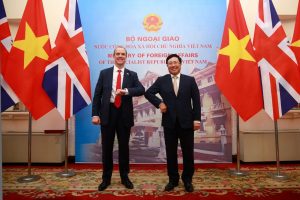The United Kingdom and Vietnam have announced that their intention to conclude negotiations on a free trade agreement in the near future.
The expected announcement came during British Foreign Secretary Dominic Raab’s two-day visit to the Vietnamese capital Hanoi on September 29-30. During the visit, Vietnamese Prime Minister Nguyen Xuan Phuc expressed hopes that his government would conclude a free trade agreement with the U.K. soon.
“Vietnam sees the U.K. as a major trading partner in Europe,” Phuc told Raab at a meeting in Hanoi, according to a Vietnamese government statement. He added that a trade deal with Britain would “help both countries to boost economic recovery in post-COVID-19 pandemic period.”
The announcement follows a phone conversation on July 13 with his Vietnamese counterpart Pham Binh Minh, during which the pair agreed to push toward the signing of a trade deal.
Raab’s visit to Vietnam, part of a tour that also took him to South Korea, is the first of what will no doubt be many British diplomatic sallies into the Indo-Pacific in the post-Brexit era. Recently unburdened of its membership in the European Union, London is eager to build new bilateral trading partnerships as part of its “Global Britain” rebranding under Prime Minister Boris Johnson.
Improved relations also make sense in light of the U.K.’s recent souring of views toward China and increasing concerns about its assertive behavior, particularly in the crucial South China Sea. In particular, Raab’s visit comes amid recent suggestions that the Royal Navy might deploy its new aircraft carrier, HMS Queen Elizabeth, to the Indo-Pacific.
“Vietnam has a key role to play in regional stability in East Asia,” Raab posted on Twitter on September 30. I met with [Pham Binh Minh] earlier today to re-emphasize the UK’s commitment to work together, including on maritime security, Myanmar and multilateralism through [the Association of Southeast Asian Nations].”
Vietnam, too, has good reasons to push for thicker economic linkages with the U.K., with which it has had a Strategic Partnership since 2010. While the country has been a global coronavirus success story, and is one of the few nations in Asia that are projected to record a positive growth rate for 2020, COVID-19 has weighed heavily on its export-driven economy. Last month, Hanoi was forced to halve this year’s growth target to 2.5 percent, down from the more than 5 percent it forecast in May. An FTA with London would provide an additional spur to recovery.
Such an agreement would also dovetail with Hanoi’s broader attempt to diversify its trade relationships and reduce its heavy economic reliance on China, with which it has a large trade deficit. In recent years, Vietnam has signed more than a dozen free trade agreements, including one with the EU, which came into force in August.
Hanoi is also one of the most enthusiastic participants in the 11-country CPTPP free trade pact, the successor agreement to the star-crossed Trans-Pacific Partnership. The deal was painstakingly negotiated by U.S. President Barack Obama before his successor Donald Trump wrenched the U.S. out of the agreement during his first days in office.
The U.K. Foreign Secretary also announced that the U.K. had secured Vietnam’s public support for it to join the CPTPP, previously known as the Comprehensive and Progressive Agreement for Trans-Pacific Partnership. In a post on Twitter, Raab described this as “a significant step in taking the U.K.-Vietnam economic relationship to the next level, and demonstrating the U.K.’s commitment and value to the region.”
In addition to Vietnam, the CPTPP’s current signatories are Canada, Australia, Brunei, Chile, Japan, Malaysia, Mexico, New Zealand, Peru, and Singapore.

































